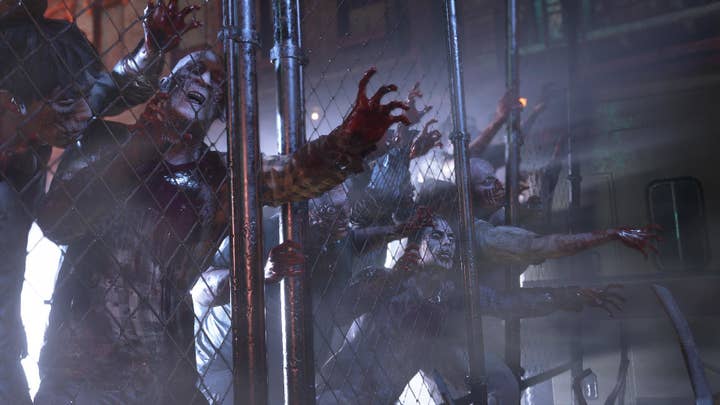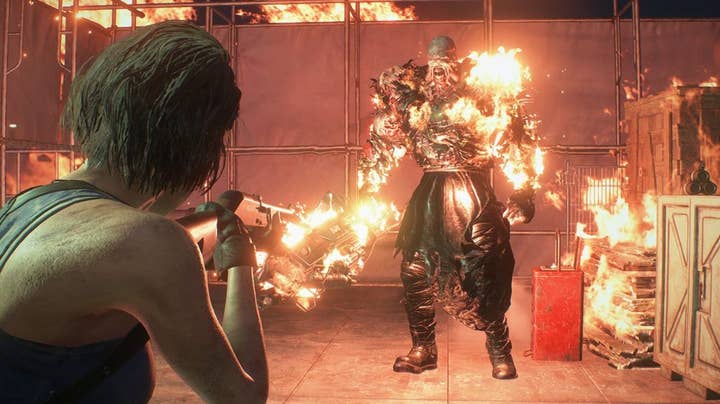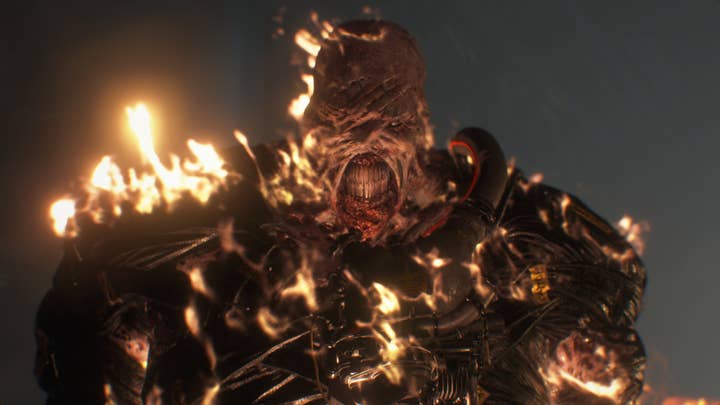Resident Evil 3: Critical Consensus
Capcom's third remake finds the classic series at a turning point -- and there are dissenting voices amid the critical praise
Within the growing trend of HD remakes, the Resident Evil series is something of a paragon.
Far from an attempt to make good money from old rope, Capcom has poured a great deal of time, effort, and money into rebuilding its classic series for modern sensibilities. That was plain in Resident Evil 2, a game from 1998 that fully deserved its place on a vast number of Best of 2019 lists -- and made a handsome return on investment in the process.
What Capcom achieved with Resident Evil 2 was by no means simple, but it helped that the bones of the original version were so strong. With Resident Evil 3 -- already in production before RE2 was even released -- the Japanese publisher is running headlong into perhaps the biggest flaw in the concept of making new versions of old games. The third entry in the celebrated franchise has perhaps the most chequered reputation of any of the first four, and many of its problems can only be finessed, not eliminated.
You can remake the past, but much like the marauding villain at the centre of Resident Evil 3, you can't outrun it entirely.
"The atmosphere around you is always pulling out all the stops to make you feel vulnerable"
IGN
You can make it look the part, however. Detail and atmosphere are the most consistently praised aspects of Resident Evil 3, which currently holds a Metacritic score of 80 after more than 60 reviews -- very healthy, but a notable step down from the 91 score attained by Resident Evil 2. IGN's Lucy O'Brien, who wrote a glowing review, described the "incredible job in the small details" that brings Raccoon City to life.
"From the in-universe advertising..., to the detritus left by citizens who had to escape in a hurry, to Resident Evil 2-related Easter eggs..., and genuinely compelling in-game notes and journals that give background context to some poor guy's tragic death and/or reveal a code to open a safe. These are spaces that feel realistically inhabited and then abandoned, full of the sort of detail that had me poring every inch of a room after I'd killed everything in it.
"This detail and polish extend to Resident Evil 3's broader environments, which are stunning. Smashed cars are piled up outside of flickering neon signs, fires lick their way across kitschy storefronts, and broad industrial spaces are eerily empty. Although you can't interact much with the world unless you are specifically instructed to... the atmosphere around you is always pulling out all the stops to make you feel vulnerable and small. Not to lean too much into cliches, but I literally jumped at my own in-game shadow more than once."

The surface may sparkle, but VG247's Kirk Mckeand takes issue with the underlying structure. If O'brien's review is probably the most positive of any major publication, McKeand's is among the most damning. The early Resident Evil games are very much about place, he argues in his three-star review, but the third entry was far more linear than its predecessors.
"You start each game fumbling around its haunted houses -- whether they're extravagant mansions or museums that have been turned into police stations -- and eventually you become so familiar with them that they feel like home. Resident Evil 3 Remake feels more like a single room in a Travelodge.
"Resident Evil 2 Remake's Raccoon City Police Department was so well realised that it was always going to be difficult to top, but this sequel feels like a step backwards in almost every way.
"Nemesis is a hindrance, an undefeatable creature blocking me from that goal... consistently more annoying than fun"
Vice
"Rather than a few intricate but large spaces, there are more areas with less intricacy. You're often following a linear path to the next cutscene, of which there are many. If Resident Evil 2 Remake is a haunted house, Resident Evil 3 Remake is a rollercoaster at Alton Towers -- let's say Nemesis for thematic consistency."
Whether linear design can be entirely fixed in a remake speaks to an issue deeper than any one game. Resident Evil 2's main location was immaculately designed in the source text, and made even better in the remake. Resident Evil 3 was more linear by design, and you can only add so much to a game before it becomes something else entirely.
The same question is raised by the gameplay concept that gave Resident Evil 3 its "Nemesis" subtitle -- a powerful antagonist that resurfaced frequently throughout the game, providing a lingering threat and a platform on which to build set-pieces. Nemesis was intended to be a logical amplification of Mr X in Resident Evil 2, but it is as divisive in the remake as it was in the original game.
"The issue is that he's much less mechanically interesting than Mr. X," Vice's Matthew Gault wrote in a largely negative review. "Rather than a constant presence that's putting pressure on the player to plan routes and avoid certain rooms, Nemesis is a boss monster that shows up when you're ready to leave an area and move on to the next.

Gault added: "Nemesis is a hindrance, an undefeatable creature blocking me from that goal... consistently more annoying than fun. He's never a presence stalking you. You're either running from him to get to the next area, or standing your ground in an attempt to defeat him. The game always makes it obvious which track you're supposed to take because Resident Evil 3 is a series of linear set-pieces."
"For good and ill, Resident Evil 3 takes last year's Resident Evil 2 remake and hones it into something meaner"
Kotaku
It is worth emphasising that opinion is split on how important Nemesis is for the experience. Those who enjoyed being pursued by a seemingly unstoppable force -- more Michael Myers than shambling undead -- also tended to appreciate the direction Resident Evil 3 was taking the series as a whole. Resident Evil 2 mixed kinetic action into the finely honed single location established by the first game. In Resident Evil 4, the series embarked in a direction that would ultimately inspire games like Gears of War, and conclude with the uneven fifth and sixth entries.
Resident Evil 3 was a bridge back in 1999, and today's critics have the advantage of knowing what waited on the other side. As such, some reviews are critical of the game for being neither fish nor fowl, but others celebrate a finely balanced mix of survival-horror and action.
"The Resident Evil 3 remake transplants that experience into a modern framework and ratchets up an already intense experience into something downright exhausting -- I mean that in the best possible way," Kotaku's Heather Alexandra wrote. "Resident Evil 3 is a better modernization than last year's fantastic Resident Evil 2 remake. Where that game was still puzzling out a change in format and occasionally struggled to forge an identity, Resident Evil 3 proceeds with wonderful confidence. It won't be everyone's cup of tea but Resident Evil 3 knows what it wants to be."
Alexandra added: "Resident Evil 3 is loud. It is a snarling dog too close to your face, spittle flying everywhere. For some players, the intensity will be a turn off... It marked the first step in a tonal shift that arguably went too far: As the series progressed, the action grew too excessive.
"The remake threads a spectacular needle. The explosive boss fights and ever-present cat and mouse chases never feel out of place. Windows shatters as the zombie horde bursts in, giant lizards swallow you whole, and the Nemesis slams down behind you at the worst moment. The terror doesn't fade simply because you have an assault rifle or grenade launcher. For good and ill, Resident Evil 3 takes last year's Resident Evil 2 remake and hones it into something meaner."

